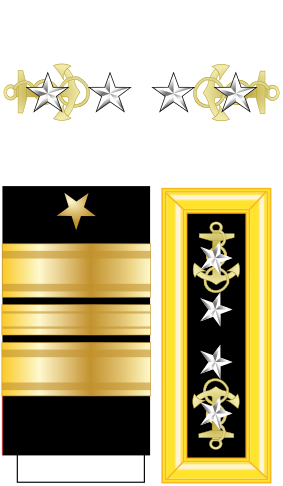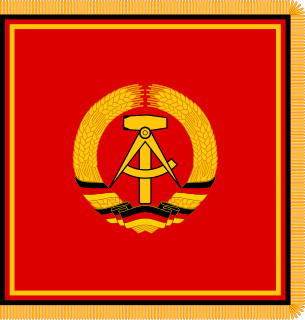 W
WThe Admiral of the Navy is the highest possible rank in the United States Navy. The rank is equated to that of a six-star admiral and is one of the two highest possible military ranks in the United States Armed Forces. It has only been awarded once, to George Dewey, in recognition of his victory at Manila Bay in 1898.
 W
WThe Brotherly Leader and Guide of the Revolution of the Great Socialist People's Libyan Arab Jamahiriya was a title held by former Libyan leader Muammar Gaddafi, who claimed to be merely a symbolic figurehead of the country's official governance structure. However, critics have long described him as a demagogue, referring to his position as the de facto former political office, despite the Libyan state's denial of him holding any power.
 W
WEmperor of Central Africa was the title used by Jean-Bédel Bokassa from 4 December 1976, and was crowned on 4 December 1977 in a lavish ceremony that was estimated to cost his country US$20 million. Although nominally a constitutional monarch, in practice Bokassa ruled with absolute power. For all intents and purposes, the country was still a military dictatorship, as had been the case since Bokassa took power in the 1966 coup d'état.
 W
WGeneralissimus of the Soviet Union was a military rank created on 27 June 1945, following the tradition of the Imperial Russian Army. It was granted to Joseph Stalin following World War II. It was the highest military rank in the Soviet Union.
 W
WNew Zealand Herald of Arms Extraordinary is the officer of arms responsible for the regulation of heraldry in New Zealand. Although affiliated with the College of Arms in London, the New Zealand Herald lives and works in New Zealand, and is not a member of the College Chapter. The current New Zealand Herald of Arms Extraordinary is Phillip Patrick O’Shea.
 W
WThe president of the German Democratic Republic was the head of state of the German Democratic Republic, commonly known as East Germany, from 1949 until 1960. The office was created by the Constitution of 1949. The president of the Republic was elected by the People's Chamber (Volkskammer) and the Chamber of States (Landerkammer), the two chambers of parliament. The office was mostly ceremonial in nature. If necessary, the President of the Volkskammer acted as the president of the Republic.
 W
WThe president of the Socialist Federal Republic of Yugoslavia, or the president of the Republic for short, was the head of state of that country from 14 January 1953 to 4 May 1980. Josip Broz Tito was the only person to occupy the office. Broz was also concurrently President of the League of Communists of Yugoslavia. Broz was eventually declared president for life and with his death in 1980 the office was discontinued and the new office of President of the Presidency of Yugoslavia took its place.
 W
WPrince of Spain, was the title created on 22 July 1969 designated by law proclaiming Juan Carlos de Borbón as the successor of Francisco Franco. Juan Carlos held the title until 22 November 1975, when he became King of Spain following the death of Franco. The only person to hold this title was Juan Carlos; the title given to the heir to the Spanish throne has since been Prince of Asturias.
 W
WFor two years from Malawi's independence in 1964, the country was a monarchy with Elizabeth II as its queen. She was also the Sovereign of the other Commonwealth realms, including the United Kingdom. The 1964 Constitution of Malawi vested executive power in the Queen, as head of state, though her constitutional roles were delegated to her representative, the Governor-General.
 W
WThe Vice President of the Russian Federation was the first in the presidential line of succession, becoming the new President of Russia upon the death, resignation, or removal of the president. Additionally, the vice president would assume the presidential duties in case the president becomes incapable of carrying out the presidential duties.
 W
WVice President of Rwanda was a political position in Rwanda created for Paul Kagame from July 1994 to 2000. The office was abolished in 2000. The position also existed in Rwandan constitution from 1961 until 1973.